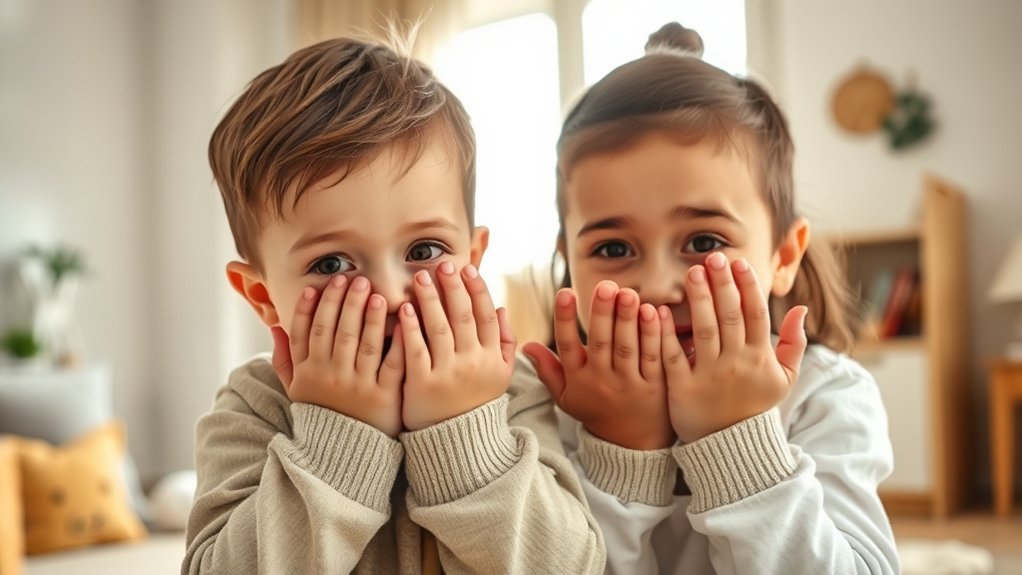Imagine your baby’s face lighting up when you peek out from behind your hands, laughter bubbling up as they recognize you. Peekaboo isn’t just a playful moment; it’s an essential tool for developing your child’s cognitive, social, and emotional skills. By understanding its benefits and learning how to play effectively, you can enhance your little one’s growth in fun and engaging ways. Let’s explore how to make the most of this timeless game.
Understanding the Cognitive Benefits of Peekaboo
When you play peekaboo with a baby, you mightn’t realize just how much this simple game contributes to their cognitive development.
This playful interaction helps babies grasp the concept of object permanence—the understanding that objects still exist, even when they’re out of sight. By repeatedly hiding your face, you’re teaching them that things can come and go, which enhances their memory and recognition skills.
Moreover, the anticipation and surprise elements stimulate their problem-solving abilities, as they begin to predict when you’ll reappear. Each time you pop back into view, you’re not just entertaining them; you’re building their brain’s neural pathways.
Enhancing Social Skills Through Play
Although it may seem like just a game, playing peekaboo greatly enhances a baby’s social skills. This simple activity teaches your little one the fundamentals of interaction. As you hide and reappear, they learn about attention, anticipation, and response.
They’ll begin to understand the back-and-forth rhythm of communication, which is essential for developing relationships. When you smile and engage them during the game, it reinforces positive social cues. Your baby starts to recognize facial expressions and vocal tones, helping them interpret emotions.
Plus, peekaboo fosters a sense of belonging and connection, making them feel secure in social situations. So, incorporate this playful game into your routine—it’s not just fun; it’s an important step in nurturing their social development!
Boosting Emotional Intelligence in Infants
Building on the social skills developed through games like peekaboo, you can also boost your infant’s emotional intelligence. Engaging in this classic game allows your little one to experience a range of emotions—from joy to surprise—helping them recognize and understand feelings.
As you disappear and reappear, use expressive facial cues and varying tones of voice to convey excitement and warmth. This encourages your baby to read emotional signals and respond appropriately. You can also mirror their emotions during play; if they giggle, respond with laughter.
These interactions lay the groundwork for empathy and emotional awareness. By fostering these connections, you’re not just playing; you’re nurturing an essential skill that will benefit them throughout their life.
Tips for Incorporating Peekaboo in Daily Routine
Incorporating peekaboo into your daily routine can be both fun and beneficial for your baby’s development. Start by setting aside a few minutes each day for this engaging game. You can play during diaper changes, bath time, or even while waiting in line.
Use different objects or your hands to keep the surprise fresh and exciting. Make silly faces and sounds to enhance engagement, as babies love vibrant expressions. Remember to follow your baby’s cues; if they seem bored, switch it up!
You can also invite siblings or other family members to join in for added fun. Regularly playing peekaboo creates joyful moments, strengthens bonds, and encourages your little one’s cognitive and social growth. Enjoy the laughter together!
Variations of Peekaboo for Different Age Groups
As your baby grows, you can adapt the classic game of peekaboo to suit their developmental stage. For infants, simple face hiding and revealing works best. As they become toddlers, add props or sound effects to keep the excitement alive. Here’s a quick guide to variations:
| Age Group | Peekaboo Variation |
|---|---|
| 0-6 months | Cover your face with hands |
| 6-12 months | Use a blanket or scarf |
| 1-2 years | Hide behind furniture or toys |
| 2+ years | Incorporate storytelling elements |
These adaptations not only enhance engagement but also promote cognitive development. So, switch it up and enjoy the laughter and learning!
Frequently Asked Questions
What Age Is Ideal to Start Playing Peekaboo?
You can start playing peekaboo as early as six months old. Babies at this age begin to understand object permanence, making it a fun and engaging game that fosters your bond and encourages their cognitive development.
Can Peekaboo Help With Separation Anxiety?
Yes, playing peekaboo can help ease separation anxiety. It teaches your child that even when you disappear, you’ll return. This simple game builds trust, reinforcing their understanding of your presence and absence in a playful way.
How Long Should Each Peekaboo Session Last?
Each peekaboo session should last around 5 to 10 minutes. Isn’t that just the perfect amount of time to keep your little one engaged? This way, you’ll maintain their interest while fostering emotional connections.
Are There Specific Phrases to Use During Peekaboo?
Yes, you can use playful phrases like “Where’d you go?” or “I see you!” to engage your little one during peekaboo. These phrases spark curiosity, enhance excitement, and make the game even more enjoyable for both of you.
Can Peekaboo Be Played Virtually or Online?
Absolutely, you can enjoy a delightful game of peekaboo online! Utilize video calls to create that engaging experience, allowing you to share laughter and joy, even from a distance. It’s a modern twist on a timeless classic.
Conclusion
In the game of peekaboo, you hold a mirror to your child’s developing world, reflecting joy, curiosity, and connection. Each playful moment symbolizes the growth of trust and understanding, as you reveal not just your face, but the endless possibilities of their emotions and social interactions. By weaving this delightful game into your daily routine, you’re not just playing—you’re nurturing their journey toward becoming confident, empathetic individuals ready to embrace the world. Keep playing; the magic unfolds!
